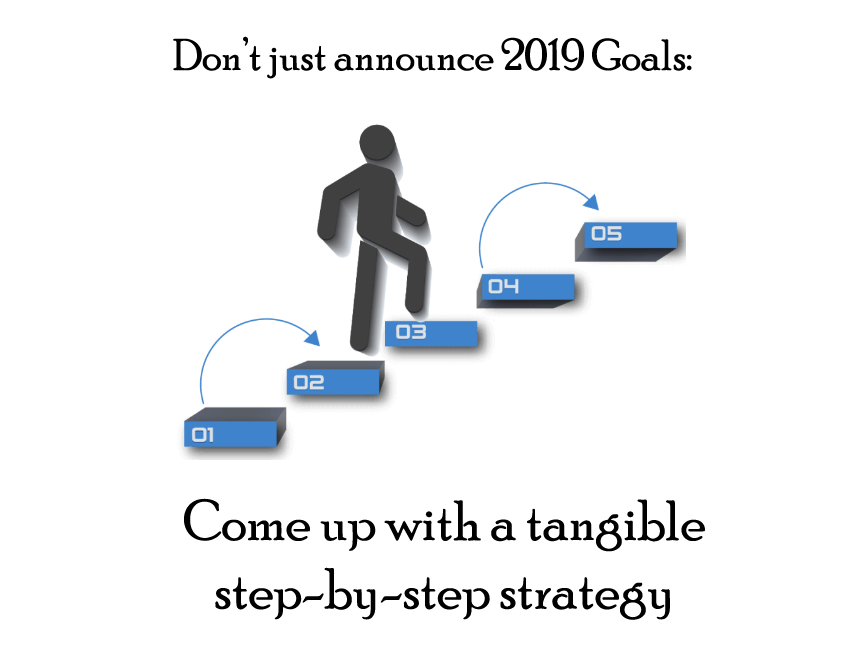Don’t just announce 2019 Goals: Come up with a tangible step-by-step strategy

Even if you’re an anti-New-Year’s resolutionist, it’s hard not to think of a new year as a chance to make changes, or an opportunity for a clean slate, so to speak.
As a result, whether or not you’re the type to embrace a stated resolution, most of us end up spending at least a bit of time thinking about what we’d ideally like to accomplish in the upcoming year.
More often than not, though, there’s little follow through as the year goes by. Sometimes we maybe achieve some of what we wanted to and don’t realize it, other times we fall off our new plan by February or March, and sometimes we admittedly give up or forget about the goal entirely halfway through the year.
I personally believe it’s because we list goals and dreams without actionable items, and without any appreciation for the process. Either that, or our goals are so vague, such as “spend less money,” or “get more fit” they’re sometimes hard to measure.
And even when they’re more specific, such as, “I want to lose 50 lb. this year,” or “I want to make $100,000 this year,” they often still lack a course of action or direction.
If you have 2019 goals mulling around in your brain already, here’s what I suggest this year. Break your life into the following 8 categories:
1. Health/Fitness
2. Nutrition
3. Professional
4. Social
5. Financial
6. Family
7. Mental
8. Spiritual
Then come up with a goal for each category. If a category don’t resonate with you, then skip it, but for the most part we probably have things we’d like to “achieve,” or progress we’d like to make, in each category.
From there, come up with three to five actionable items that will help you achieve each of your goals. Placing deadlines when applicable for each actionable item also helps.
Here’s what I mean by actionable item: It’s something you can actually do, an action you can take to help you control your destiny and your goal (as much as we can control our destinies).
Example #1:
Financial Goal: Spend less money on groceries (vague goal)
Strategy/Actionable items:
Step 1: Figure out how much I spend per month right now and come up with a definite number in terms of what I hope to save per month. Deadline: January 3rd.
Step 2: Research to figure out what types of groceries are best to buy from what store. Then actually write down where I intend to buy what. Deadline: January 5th.
Step 3: Commit to devoting three or four hours on Saturday or Sunday to meal prep and batch cook lunches and some dinners for the week. Start this weekend.
Step 4: Limit my meals out to once a week (or whatever you decide on).
Step 5: Keep track of my receipts each month so I can keep tabs on what I’m spending each week and each month. Write down what I spend each week and take notes when I eat out, so I can ensure I’m sticking to my plan.
Example #2:
Physical Goal: Workout 5 days per week
Though this goal is less vague than the financial one about “saving money”, you still need a strategy to ensure you follow through.
Step 1: Find a reliable training partner or two to meet with to hold me accountable to showing up five days a week.
Step 2: Start to follow a specific program, like a strength program or an endurance program, too hold me accountable to these 5 days a week.
Step 3: Come up with a more tangible measurable goal, too, such as a 300 lb. back squat or a 6-minute mile. (Having a number you’re striving for might help you stay more accountable and work harder during your training).
Step 4: Commit to certain days and or times I’m going to workout each week and put it right into my calendar (Monday, Tuesday, Thursday, Friday and Saturday at 6 am during the week and 9 am on Saturday)
Step 5: Track my workouts so I can watch my progress and take note of whether or not I’m reaching my goal each week.
While the above is quite generic, I recommend being as specific and personal as you can be with your goals, and more importantly, with your strategies to get there.
And make sure you keep track of it all in writing. This will help you stay accountable and it feels great to look back and see all that you have accomplished. What you’ll find is even if you don’t end up getting that 300 lb. back squat, for example, or you don’t save quite as much money on groceries as you wanted to, you’ll likely still be further ahead than you were the year before and you’ll be able to appreciate the small wins along the way.
Just like anything else, it’s about the journey more so than the outcome, so pay attention to and enjoy the journey!
Good luck, and feel free to reach out to your coaches for more help if need be.





